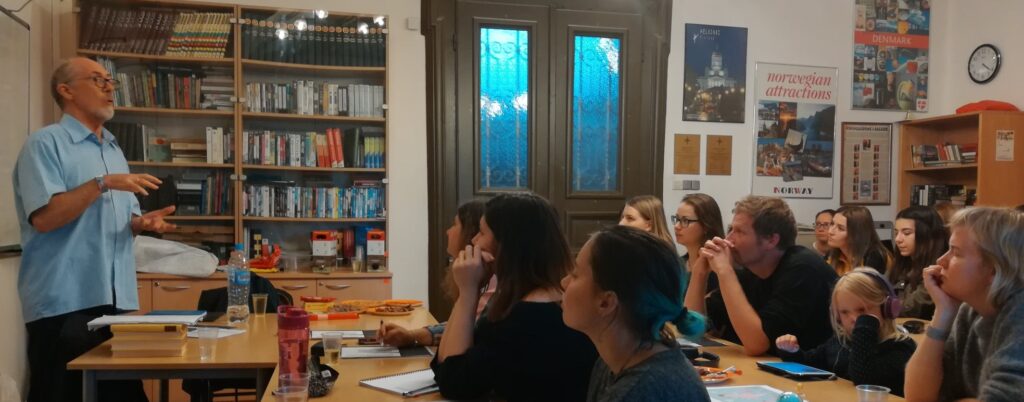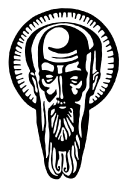History and Development
The inception of Scandinavian Studies as an academic discipline at Sofia University St. Kliment Ohridski responded to the vivid interest of the Bulgarian community in the languages and culture of the Nordics.

Lecture by Prof. Nils Magne Knutsen (UiT, Norway) for students in Scandinavian Studies, May 2019
The idea for establishing a Department of Scandinavian Studies within the Faculty of Classical and Modern Languages was proposed by the Department of German Studies at a faculty meeting on 18th June 1991. The idea of introducing an academic discipline of Scandinavian Studies also received support in preliminary discussions with diplomatic officials from the embassies of Denmark and Sweden in Bulgaria, who assured the representatives of the university that assistance would be provided. Later, at a meeting held on 20th Nov 1991, the Academic Committee voted unanimously in favour of the suggestion of the Dean of the Faculty of Classical and Modern Languages that a Scandinavian Studies programme and a Department of Scandinavian Studies should be established. Professor Boris Parashkevov, a linguistics scholar and translator of fiction and scholarly literature from German and Finnish, was elected Head of Department.
In 2000, pursuant to a decision of the Academic Committee concerning the consolidation of several departments of the Faculty of Classical and Modern Languages, the Scandinavian Studies Programme was transferred to the Department of German Languages, one of the oldest and most prestigious departments in the system of Bulgarian education. Thus, a new Department of German and Scandinavian Studies was formed. Until 2011 the Scandinavian Studies Section of the Department was led by Professor Vera Gancheva, one of the founders of the programme and a scholar of Nordic and especially Swedish literature and culture. At present, the programme is headed by Senior Assistant Professor Antonia Gospodinova, PhD, a specialist in Norwegian literature and culture.
The principal language of study in the Section was Swedish until 2005, when the teaching of Norwegian was introduced as an equivalent option. Between 2006 and 2024, these two Scandinavian languages alternated, as each was principal for the students enrolled every other year. Beginning in the academic year 2024-2025, Danish is a possible principal language, too, and the three languages alternate in the sequence Danish – Norwegian – Swedish. Another change concerns the length and number of courses of study: initially, the Section offered a single five-year programme whose graduates obtained a master’s degree directly, but in 2003, in connection with the Bologna Process, it was transformed into a four-year bachelor’s programme. Subsequently, two Master’s programmes were also established – the Nordic Studies programme, which is suitable for bachelors in various subjects (offered since 2004), and the master’s programme in Scandinavian Studies (Language, Culture and Translation), which is offered to students who already hold a bachelor’s degree in Scandinavian Studies (available since 2012). Both were originally three-semester programmes, but the latter was condensed into two semesters in 2018.
Since 2008 the Scandinavian Studies Section has maintained a Hans Christian Andersen Center for Research and Information, which was established as a branch of the H. C. Andersen Center at the University of Southern Denmark – Odense. Since 2011 a Swedex Test Centre has also been affiliated with the programme; it organises examinations for proficiency in the Swedish language in accordance with the Common European Framework of Reference for Languages.
In 2015, the Department of German and Scandinavian Studies was awarded the Swedish Academy’s Prize for the Popularisation of Swedish Culture Abroad in recognition of the Section’s activities in the sphere of Scandinavia’s cultures and languages and its contribution to collaborations at different levels between Bulgaria and the Scandinavian countries.
